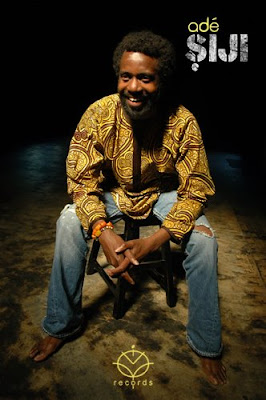LET THERE BE LIGHT:
PUBLIC ACCESS TO INFORMATION IN A STRUGGLING DEMOCRACY
Delivered by Dele Olojede at the 4th Annual Aelex Lecture, Muson Centre, Lagos, July 24, 2008
An Area of Darkness
On this Equatorial belt, where our ancestors chose to settle so long ago, we are bathed in the light of the sun for more than 12 hours on most days. And because we value the sunlight, we are uncomfortable with the dark. In all our languages, and with the stranglehold of superstition on our culture, we have come to associate the dark with all manner of terrible and malignant things.
And so we have usually preferred to conduct our affairs in the open, in broad daylight. Every significant marker of our existence—births, weddings, deaths—all unfold with extravagant openness, leaving only those which are meant to frighten, or which are forbidden, for the dark.
Except of course, in our modern politics.
Here, we exist almost entirely in an area of darkness, where any demand to share information is treated with great suspicion, and our political class regards itself largely as unaccountable to the public.
The conduct of our affairs, in the political sphere, can most usefully be likened to a feeding frenzy, where all tiers of government have effectively fallen under the sway of unrestrained men [and the occasional woman.]
The public business goes on largely behind closed doors, and the sharing of the most elementary information is viewed with horror. Even the president’s health is seen as government secret, leading to wild rumours and dark prophesies about the fate of the leader of the country. The specific ailments of a man supposedly hired by 140 million people to help run their affairs is deemed to be none of their business.
It is in this atmosphere that we must of necessity consider the reluctance to pass into law the Freedom of Information Act. The Act aims to bring a number of existing laws, notably the crudely colonial and militaristic Official Secrets Act, into conformity with our current constitution.
In its essence, the Freedom of Information Act seeks to let the people in on how the sausage of government is made. Every citizen will have the right to access public records, such as contracts, budget provisions, legislative votes, rules and regulations, and other government decisions.
As currently envisaged, and also in its previous incarnations, the draft law carefully balances the public’s right to know with the exigencies of governance. It exempts, for example, information that has a direct bearing on national security. The law would not guarantee me a right to ask the military, for instance, to disclose to me any plans for invading Niger or Cameroon. It would also preclude disclosure of certain law enforcement information, and aspects of the conduct of foreign affairs whose premature disclosure may injure the nation’s interests. It also protects individual privacy—for example, a private citizen’s tax information, except as specified by law.
But as in all societies that aspire to greatness, the proposed law presumes that an informed citizenry is a necessary condition for social progress. It presumes that the people should, quite logically, have the right to know how their business is being conducted, and how their employees, otherwise known as public officials, are performing their duties.
It starts from the premise that information should be readily available, and if there is a dispute over grey areas, then the courts can step in to resolve them.
Information is the oxygen upon which a democracy depends. It helps a society confront its true condition with sober senses, and helps dissipate the darkness of atavistic loyalties, rumour and superstition.
And of course, bringing the public business into the sunlight helps restrain the wilder impulses and the rapaciousness that we all know exist in overabundance in our political leaders. A law such as this is needed in recognition of the reality that, to paraphrase Rousseau, men are “as they are, and the law as they might be.”
It is not an accident that the Americans, who run a system that is more open that most, went even further by enacting into law a Freedom of Information Act more than 40 years ago. And it is not mere happenstance that the law took effect on their symbolically important Independence Day, the 4th of July.
On our own continent we are not even attempting to break any new ground. The South Africans, who have one of the more enlightened constitutions, already have a similar Act, as do the Angolans and the Ugandans, among others. Any minute now, Liberia will join the ranks of the enlightened.
The Language of Politics
Earlier this month the House of Representatives, which by the day resembles a bazaar, maneuvered to kill off, for now, the proposed Freedom of Information Act. The noisiest of the legislators denounced the draft law as an instrument of the media and a kind of noxious piece of legislation sure to bring the country to ruin. By which, as all sober-minded citizens surely know, they mean that the law will introduce a new and unaccustomed level of scrutiny and accountability, which is liable to get in the way of the feeding frenzy that now occurs without shame in the corridors of congress.
For its part, the Senate had seemed a tad more receptive to the idea of the Act. And the president’s spokesmen announced that the leader of our country supports passage of the law, though he does not appear to have exerted himself too mightily to ensure its passage.
We are not always so blind.
As with most Nigerian problems, everyone knows the solution, but few are willing to work for it.
An exception to our culture of secrecy was the former finance minister, Ngozi Okonjo-Iweala, who took a simple step of publishing, every month, how much each tier of government was allocated from the federation account. As a result, it was possible, theoretically and over time, for citizens to begin to engage their leaders on the specifics of how the commonwealth was being managed.
If this basic step had been extended and deepened, it would have been possible for residents of, say, Kotangora, to know exactly how much had been allocated to their local school, and whether the resources were going to the purposes for which they had been advertised. The same would have been true for the good people of Birni-Kebbi, or of Modakeke, who would be able to determine, if they took the trouble, whatever happened to the money meant for the local firehouse, the local dispensary, and the local police station.
This is how functioning communities have been built elsewhere, and no magical solutions, or fruitless invocations of divine intervention, are needed to build ours.
Alas, the current minister of finance apparently sees no merit in this arrangement, which has the advantage of doing a lot of good without any obvious legitimate downside. We are unprepared, it appears, to harvest even the low-hanging fruit.
In our dysfunctional politics, language has been deployed as a weapon by bleeding it of all meaning.
Supporters and opponents of transparency alike use the same words and phrases. I make it my business to regularly interact with our political leaders, and I have yet to meet one who is against accountability, transparency, ethics, or due process. It was the same way I never met a single white South African, in the years following the release of Nelson Mandela from prison, who ever, ever supported apartheid. In fact, everyone in our political firmament proclaims, often loudly, that they are for all these good things, including the current fad and my personal favourite, “the rule of law.”
In reality, the fervency of the proclamation of the “rule of law” has proved inversely proportional to actual law enforcement, as anyone who lives in our beloved land can attest through everyday experience. One needs only drive around, or visit a police station, or engage in any kind of exchange with another citizen, to understand that the rule of law, no matter how repeated with great affection, is the farthest thing from the reality of life on these shores.
And yet, language does have the power to inspire the dispirited, to free the oppressed, and to rally a nation, as we have seen throughout history. Lincoln gave one of the shortest and most powerful speeches ever given by a human, at Gettysburg, when he rallied his troops around the idea that their sacrifice was for nothing less than to ensure that “government of the people, by the people, for the people, shall not perish from the face of the earth.” Nkrumah stood before his people at independence to proclaim, “Africa is free forever!”—thus inspiring a shackled continent to believe that freedom was indeed around the corner. Churchill gave courage to a small island at its darkest hour by vowing, “We shall never surrender.” Mandela, facing a death sentence in a Pretoria courtroom not that long ago, declared solemnly that racial justice was “an ideal for which I am prepared to die.” King related his dream in front of the multitudes, a powerful imagery of hope for the disillusioned. And standing in the dock in 1953, his band of revolutionaries in tatters, Castro defiantly kept hope alive be declaring, “Condemn me. It does not matter. History will absolve me.”
So yes, language can be a potent tool in the service of social transformation. No one ever felt the stirring of the heart while listening to a leader say, “on the one hand; on the other hand.”
But when language is drained of meaning, its effect can be disastrous.
Both houses of the national assembly, you may recall, already had passed the Freedom of Information Act, in 2006. At least in the public explanations offered, the act was allowed to wither and die over the meaning of words.
The Man Who Knew Everything
The former president, Gen. Olusegun Obasanjo, now fitfully retired to his beloved farm, reportedly stated that he refused to sign the law in part because he was unhappy with its name! Apparently the man did not want information to be free, hence his stated aversion to the “Freedom of Information Act.”
For thoughtful citizens, this was one of the more damaging decisions taken throughout Obasanjo’s presidency, precisely because the Freedom of Information Act is one of those foundational things that help set a country on a long journey towards the light. It is more damaging because it goes to the heart of what quality of citizen a society ultimately produces—and thus the progress, in a very real sense, of that society itself. Without it—without, it must be said, an informed population-- almost no tangible and lasting advances are possible.
That Obasanjo, who had the unusual good fortune of a second chance, chose to fritter away much of it in the end points to his enduring paradox.
His opposition to the Freedom of Information Act actually had less to do with the inappropriateness of the bill’s title, and more to do with the former president’s visceral hatred of the media. In his mind, the law was really about granting license to reporters to rummage around politicians’ closets. He did not see it at all as conferring certain inalienable rights upon the citizen, for whom he had expressed contempt on more than one occasion.
The tragedy of Olusegun Obasanjo was that he was equal parts patriot and scoundrel; visionary and utterly blind; reformer and destroyer. He had large ambitions for his country but suffered from the Napoleonic complex—l’etat ces’t moi: I am the state. He was the man who knew everything and, therefore, knew nothing. He was not beyond pettiness and casual cruelty, and remained old school to the end, unable to help us move beyond the era of the Big Man.
The dishonesty of his stated reason for letting the Freedom of Information Act die from neglect is the same dishonesty that envelops the current explanations from opponents of the Act in the National Assembly.
The Mimic Men
Our current crop of political leaders, particularly in the national legislature, is, if anything, even more willfully avaricious than the previous bunch. To be fair, though, they are not that materially distinguishable from the rest of the political elite, deeply embedded at the state and local government levels, which conducts itself in the manner of those described by V.S. Naipaul as the “mimic men.”
In every measurable way, our ruling elite sees itself as the successor class to the colonial authorities, the main difference being the current leaders are incapable of running anything.
Members of this exalted group see the citizen as a bother and an irritant, to be abused daily and spat upon, and certainly not deserving of any information, save as doled out in whatever version by the rulers, and often bearing little semblance to reality. The basic functions of the state have long been abandoned, and all the paraphernalia of governance has been redeployed in the personal service of the political elite and the most privileged citizens.
If we must speak frankly, are the police not now merely used as private security in the service of the powerful? A young in-law of mine, recently returned home from America to work for a private equity firm, was shocked the other day to find himself, complete with his own police escort dutifully arranged by his employer, driven to the airport so he can travel out safely and undisturbed by Lagos traffic. The police exist solely to protect the influential, including unsuspecting 30-year-olds. The ordinary citizen is on her own, except when someone makes a fuss over the length of her skirt. And certainly, no powerful man or thieving politician is yet convicted of violating the sharia, a law that in practice is meant by our politicians only for self-perpetuation and for the oppression of the poor.
I have digressed a bit to take you, ladies and gentlemen, on a guided tour of our political landscape, because it goes to the very heart of why the Freedom of Information Act is urgently required, if we are to create the long term conditions necessary for our country’s revival.
The Matter of Goats and Pigs
The deliberate design to keep the citizen in the dark—exemplified by the incoherent and illogical opposition to the Act—continues our aversion to the nurturing of memory.
With no paper trail, no record of our affairs that anyone has the legal right to obtain, and with no clear restraint on the ability of officials to destroy whatever does exist, we are succeeding rather well in the erasure of memory.
As far as we are concerned, the past does not exist. The past is not even past, to paraphrase William Faulkner. Only recently we witnessed the appalling spectacle of three former military leaders—Ibrahim Babangida, Muhammadu Buhari, and Abdulsalami Abubakar—making the quite extraordinary claim that the dearly departed Sani Abacha had been unfairly maligned, that he was in fact an innocent man unjustly put upon. He was not a thief. He never did any of those terrible things attributed to him.
And just like that, poof! The hundreds of millions of dollars from the estimated $3 billion of Abacha loot returned by the Swiss to the Nigerian government was a mere figment of our imagination. Alex Ibru was not shot in the eye nor was Kudirat Abiola murdered. Obasanjo was not jailed on trumped up charges at all, and Shehu Musa Yar’Adua, brother of the current president, did not even die in Abacha’s prison.
Ladies and gentlemen, Abacha did nothing wrong, and we have it on the authority of these three gentlemen in question, at least two of whom still have designs on returning to power, to do us the favour of ruling over us. On Tuesday in Minna, the endlessly self-regarding Babangida reportedly said to a visiting team studying electoral reforms, and with a straight face and without a trace of irony, that he had organised the cleanest elections in Nigeria! “Aside,” he added, “from the cancellation of the result.” The Jews call this chutzpah. The Yoruba might refer to Babangida as an ogboju. The city of Ibadan, which sprang up around a war camp as the Yoruba empire collapsed in internecine warfare 150 years ago, is saluted tongue-in-cheek as a place where the thief legally triumphs over his victim. Mr. Babangida should feel right at home in that city.
Presumably, these three gentlemen’s public exoneration of Abacha is not seen as insulting our intelligence at all, since we as citizens have no intelligence left to insult. Can there be any further proof of the eternal vigilance required of us, in our role as citizens, and the central importance of the Freedom of Information Act to lighten the burden of citizenship?
As it is, we Nigerians have not exactly covered ourselves in glory, particularly those more fortunate members of our species. As many of you have doubtless noticed, goats do roam in Ikoyi, in front of the luxury homes of our captains of industry. And so, too, are pigs reared in the medians of our avenues in the country’s most expensive neighbourhood. It is all part of what a friend calls the “ruralisation” of our urban landscape, and our elite seems incapable of guaranteeing even minimal standards in its own quarter.
How can such an elite be trusted to run a country?
Let There Be Light
The fight for the open society, and for clean and accountable government, is likely a long, if not a life-long, one. But the time is now—to stand up for it, to fight for it, and to make it worth the fighting for.
Let us stop living alongside the goats and pigs, both literally and figuratively. It is time to step again into the sunlight, to start the hard task of gradually dispelling the darkness, and to make whole again a traumatised land.
In that long struggle, the Freedom of Information Act can serve as an effective weapon.
Long ago, as a youngster in first grade in Mrs. Fatunwashe’s class, the formidable old lady would promise to reward any kid who could recite large chunks of the Bible off head. The reward often was a bowl of fried and salted caterpillars, which I much coveted. And so it has been a lifelong habit of mine, even as a lapsed Christian, to suddenly recite complete verses of the Bible.
As I prepared this speech, the opening bars of the Book of Genesis bubbled into view:
“And the earth was without form, and void; and darkness was upon the face of the deep…
“And God said, Let there be light.”
I say amen to that.
Thank you for your patience and attention.
Read more...












